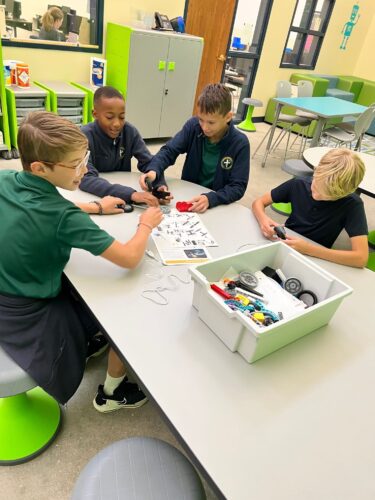Good Shepherd Elementary School in Shawnee Mission, Kansas, challenges itself to continuously achieve higher measures of performance using Cognia’s accreditation, professional learning, and instructional improvement tools.
The humorist Mark Twain once wrote that “continuous improvement is better than delayed perfection.”
Few educators could argue with this maxim. While there are too many interrelated factors that affect school performance to ever come close to perfection, educators must constantly rethink what their schools can do to be highly effective as education changes and we learn more about how children learn and what they need to develop.
 Good Shepherd Elementary (GSE) School in Shawnee Mission, Kansas, a school recently recognized by Cognia as one of 33 Schools and Systems of Distinction across the globe, certainly understands the importance of reevaluating and improving its performance. The schools of distinction were selected from among the 1,100 schools that in 2022-23 participated in the Cognia Engagement Review process for accreditation to measure their performance against the organization’s standards of quality. GSE scored 388 out of a possible 400 points on Cognia Index of Educational Quality® (IEQ).
Good Shepherd Elementary (GSE) School in Shawnee Mission, Kansas, a school recently recognized by Cognia as one of 33 Schools and Systems of Distinction across the globe, certainly understands the importance of reevaluating and improving its performance. The schools of distinction were selected from among the 1,100 schools that in 2022-23 participated in the Cognia Engagement Review process for accreditation to measure their performance against the organization’s standards of quality. GSE scored 388 out of a possible 400 points on Cognia Index of Educational Quality® (IEQ).
What is so unusual about Good Shepherd is that, although the school has been recognized among the top 5% of parochial schools in math and reading assessments in Kansas and has received global recognition for continuous improvement, it keeps redefining what it needs to do to be effective.
“The biggest challenge that the school faces is maintaining high expectations,” says Ann McGuff, who has been GSE’s principal for 20 years. “We constantly adjust to address changes in education, technology, and social and emotional needs and to address new skills students should master to be successful in high school and beyond.”
GSE is one of 36 schools that educate students in grades pre-K through 8 in the Archdiocese of Greater Kansas, which also includes six high schools. The school has 360 students and 32 staff. Ninety percent of students are white, and the school has a growing Hispanic population. About 18% of all students are on an educational plan that provides individualized support for their learning.
Digging into the Data
One of the most important ways the school keeps itself honest and continues to improve is by encouraging all staff at the school to dig into its performance data.
“We’re big on data and using evidence to find areas that we need to address,” McGuff says. “We base our decisions on objective information and analysis. Cognia’s surveys and key performance indicators tell us a great deal about what needs to happen. We always are looking at what can improve our daily instruction and when we want to tweak something.”
We’re big on data and using evidence to find areas that we need to address. We base our decisions on objective information and analysis. Cognia’s surveys and key performance indicators tell us a great deal about what needs to happen. We always are looking at what can improve our daily instruction and when we want to tweak something.
All staff meet to compare their performance against previous years and local, state, and national norms. Then the school meets in smaller groups, often by grade level, to discuss individual and grade-level student performance as well as results on benchmark assessments in the fall, winter, and spring.
During the most recent Cognia evaluation, the staff recognized that its supplemental reading comprehension program wasn’t working. The staff and leadership team continued to look at the data and gather teacher feedback and decided to immediately switch to a new program. They then watched as reading scores shot back up before the end of the year.
The Cognia Engagement Report noted that the school’s greatest strengths are its positive culture, collaborative leadership approach, and its systematic process to analyze data to make adjustments in instruction and all of its operations.
New Improvement Cycle
As part of a new improvement cycle, the school used Cognia surveys to review its mission and vision and determine what it wanted to change. Educators learned from the data that they need to give students more voice and choice in their learning, and they plan to use project-based learning as a vehicle to encourage students to take more responsibility over topics and learning activities. They also identified new reading goals and ways to reinforce the school’s biggest strength—its mathematics program.
“When some schools are successful in achieving a goal, they’ll stop what they are doing and restart,” says McGuff. “But we saw that we have to keep getting better at what we do best and love the most. Our math scores are higher than they have ever been, and we are going to try to raise them more.”
The school likely will choose a math problem-solving strategy to continue building students’ critical math reasoning.
Using Cognia Tools
To keep improving, the school takes advantage of the comprehensive Cognia tools and services at their disposal. Staff attend a broad range of Cognia professional development workshops. They analyze Cognia surveys of students, staff, and parents to understand major points of consensus, determine where their strengths are, and involve parents, students, and stakeholders directly in improvement efforts.
The Effective Learning Environments Observation Tool® (eleot®) and the Teacher Observation Tool are used to study the degree to which students are engaged and instruction is focusing on student engagement, as well as to allow teachers to observe experienced mentors in the classroom. Administrators and teachers discuss how technology is being used and what teachers are doing and can do more of to create a supportive learning environment.
One of the biggest values of working with Cognia, school leaders say, is that the evaluation, observation, and planning tools used across the 30 standards and domains of engagement have put all the teachers on the same page. The school’s teachers all speak the same language about what they are trying to accomplish and how they are going about their work.
McGuff also noted that, although Cognia’s ratings of the school’s performance were close to those of the staff, “we were harder on ourselves than Cognia was.”
“Continuous improvement is not just a day of review here and there or final year analysis and review for the accreditation report,” she says. “It’s an ongoing process where we regularly assess and refine processes and goals to exceed all stakeholder expectations. It is a growth process, and it is a crucial part of our mindset that we are all working together as a community to make things better for students.”
Continuous improvement is not just a day of review here and there or final year analysis and review for the accreditation report. It’s an ongoing process where we regularly assess and refine processes and goals to exceed all stakeholder expectations. It is a growth process, and it is a crucial part of our mindset that we are all working together as a community to make things better for students.
McGuff notes that it was a huge honor and a cause for celebration to share with the community, parents, and staff the school’s sense of pride at being selected as a Cognia School of Distinction. “It demonstrates all the work we put in to exceed high standards,” she says.
In announcing the award, McGuff wrote a letter to her parents about celebrating the accomplishment while refusing to take a victory lap.
“This award is not the culmination of our efforts but a step toward even greater achievements,” she wrote. “We will continue to strive for excellence, innovation, and continuous improvement in every aspect of our school.”
© Cognia Inc.
This article may be republished or reproduced in accordance with The Source Copyright Policy.
The information in this article is given to the reader with the understanding that neither the author nor Cognia is in engaged in rendering any legal or business advice to the user or general public. The views, thoughts, and opinions expressed in this article belong solely to the author(s), and do not necessarily reflect the official policy or position of Cognia, the author’s employer, organization, or other group or individual.

